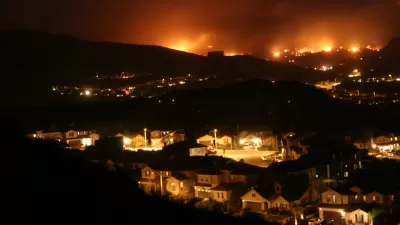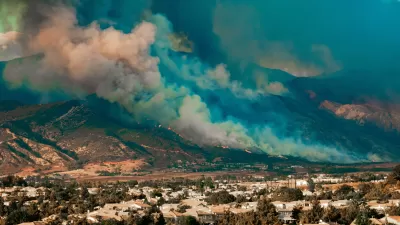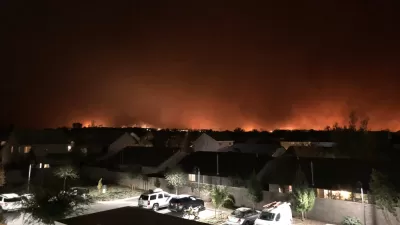With the state of California in the grips of its most destructive year of wildfires ever, policy makers are pondering questions about whether it is appropriate to rebuild in places at high risk of burning again.

"With the frequency and cost of catastrophic wildfires climbing in California, the idea of compensating property owners to not rebuild — or using economic pressure to discourage them from building in the first place — is gaining supporters among those searching for ways to cut wildfire losses," according to an article by Doug Smith.
While some policy makers and academics have proposed measures that would control the scale to which the state rebuilds in areas that have already burned, or builds new in places likely to build in the future, there are many policies in place in California that expedite rebuilding. Many in favor of rebuilding point out that new houses built to replace houses that burnt down in the fire would be built to much higher standards of fire resistance. Meanwhile, those who say the state shouldn't continue to build in fire danger areas, say a "three-strikes" rule or public land acquisition programs should be implemented around the state.
There's also the ongoing question of how to predict future fires, which was explained by an earlier Planetizen post by Katharine Jose. Along those lines, Jones reports that Cal Fire plans to revise its fire prediction maps, "[i]n light of experience showing that wind-blown embers can carry fire into suburban areas."
FULL STORY: After California's most destructive fire season, a debate over where to rebuild homes

Maui's Vacation Rental Debate Turns Ugly
Verbal attacks, misinformation campaigns and fistfights plague a high-stakes debate to convert thousands of vacation rentals into long-term housing.

Planetizen Federal Action Tracker
A weekly monitor of how Trump’s orders and actions are impacting planners and planning in America.

Chicago’s Ghost Rails
Just beneath the surface of the modern city lie the remnants of its expansive early 20th-century streetcar system.

Bend, Oregon Zoning Reforms Prioritize Small-Scale Housing
The city altered its zoning code to allow multi-family housing and eliminated parking mandates citywide.

Amtrak Cutting Jobs, Funding to High-Speed Rail
The agency plans to cut 10 percent of its workforce and has confirmed it will not fund new high-speed rail projects.

LA Denies Basic Services to Unhoused Residents
The city has repeatedly failed to respond to requests for trash pickup at encampment sites, and eliminated a program that provided mobile showers and toilets.
Urban Design for Planners 1: Software Tools
This six-course series explores essential urban design concepts using open source software and equips planners with the tools they need to participate fully in the urban design process.
Planning for Universal Design
Learn the tools for implementing Universal Design in planning regulations.
planning NEXT
Appalachian Highlands Housing Partners
Mpact (founded as Rail~Volution)
City of Camden Redevelopment Agency
City of Astoria
City of Portland
City of Laramie





























